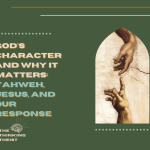
In the last series of articles, I dove into the character of God and introduced the following idea: how we view God should affect everything else in our lives. Coincidentally, I believe that our view of Jesus holds this same power.
The Heart of the Christian Worldview
At the heart of the Christian Worldview stands a Jewish Messiah who suffered for the evil of mankind (Isaiah 53). He did this so that we would not be subject to God’s justice and wrath in eternity, but could fully experience His love, joy, and mercy here and now and forever. The Messiah had specific qualities that were to be expected by the Jews. While claiming kingship over His people, being born of a virgin, and demonstrating the power to do miracles, the Messiah was also to be God’s suffering servant who would reclaim His people from the powers of the world. But when Jesus entered the scene, for whatever reason, the Jewish elite did not see Him fit to be their King; instead they killed Him.
…Yet, he didn’t stay dead.
The Christian worldview offers an answer to pain and death by presenting the Messiah as not only someone who died on a cross and suffered with us, but who also rose victoriously from the grave. This worldview is the lens through which Christians view everything around us.
In regards to the Christian Worldview then, we have a couple of important questions to ask:
- Why? Why did the Jewish elite wish Jesus to be killed?
- Was it the fact that they are constantly being blindsided by Jesus’ wisdom when they try to trap Him?
- Or was it His claims to being the Lord of Sabbath and for identifying with the name of God?
Who was Jesus?
This question rings in the ears of scholars, laymen, rich, poor, male and female; everyone in the world who comes across the story of Jesus should at least inquire: Who is Jesus?
Who was Jesus?
At my place of work, a friend of mine who took a religious studies class talked about how they as a class decided that Jesus was a political reformer, or a revolutionary of some sort. In other words, He was nothing more than another man who claimed to be a messiah who then taught some pretty wacky things.
This identification seems to be a pretty common one. After all, if one does not believe that Jesus at least claimed to be God, then the default would either be him being nothing more than a political figure or someone of less importance.
At any rate, this seemed to be the stance of the late Christopher Hitchens in his debate with John Lennox on the question “Is God Great”. In one of his quick, and many, quips he stated, “and we can talk about Jesus who never claimed to be God by the way.” One may easily be taken aback by such a statement.
Is He Right?
Did Jesus never claim to be God? Did he really not explicitly claim his divinity? Muslims seem to think so.
In the Quran, Jesus is presented as claiming nothing more than prophethood:
“He [Jesus] said: ‘I am indeed a servant of Allah: He has given me Revelation and made me a prophet’” – Quran 19:30
Jesus in the Quran is painted as nothing more than a servant of Allah, a prophet. This is also a document that denies His crucifixion, a massive historical blunder I might add, and also denies His resurrection from the dead. But is it correct on His identity? Did Jesus only claim prophethood and servanthood? Or did He also claim divine status?
The question “Who is Jesus?” is essential to the Christian Worldview. There is no way around it.
So in this series, we will focus on this question: “Who did Jesus claim to be?”
I Love Acronyms
Sometimes I find acronyms to be helpful when it comes to remembering things. Whether it’s the 6 THINGS, GRIT, or HANDS, I believe acronyms can be helpful in teaching students and adults, and for remembering things in general. For anyone in seminary or who has a theological background, or even if you’ve deep-dived into the claims of Jesus, you may have come across the book titled Putting Jesus in His Place: The Case for the Divinity. The acronym that we will explore is explained thoroughly in this book.
Our acronym that we are going to dive into is H.A.N.D.S.
Jesus shares the Honor of God, the Attributes of God, the Names of God, the Deeds of God, and the Seat of God. Let’s get a quick overview of these before closing out.
The HONORS of God
Who we give honor to and who we worship matters. In a monotheistic culture as the Hebrews were, worship was due only to Yahweh and Yahweh alone. What makes this a big deal is that throughout the Gospels, Jesus received such honor and worship in place of God. From receiving honor and praise after His resurrection to receiving honor from His disciples, Jesus received worship at very key points in the Gospels. While at any point Jesus could’ve said “No, don’t worship me!” He instead accepts it as His due.
The ATTRIBUTES of God
If Jesus were God, what kind of attributes would you expect Jesus to possess?
In the Gospels, Jesus is presented as eternal (having claimed to exist even before His physical birth) is presented as omniscient, and omnipotent. He shows a knowledge of future events, the ability to raise people from the dead, and shares in the forgiveness of sins that only God has the authority to give.
The NAMES of God
Names matter. And for the people of Israel, the name Yahweh was especially important. This name would be used only in a position of reverence and trembling as it was understood to be the very name of God. I Am, as it is also translated, is shown in Exodus 3:14. Does Jesus claim this name? You bet!
From His trial before the Sanhedrin to the many ‘I AM’ statements in the Gospel of John and receiving the title “The Lord”, Jesus willingly and consistently identified with the names of God. He also called Himself the Son of Man, harking on the divine figurehead as described in Daniel 7. As we will see, Jesus shared in the very names of God.
The DEEDS of God
You may have caught on that in the Gospel accounts, Jesus has implicitly claimed divine status. And so we have reached a question about His abilities: If Jesus were divine, what would He be able to do?
Do you expect Him to heal the sick? Check
Could He forgive sins? Yep
Did He walk on water? He did indeed
Were the lame and blind healed? He did that as well
Could and did He raise the dead, cast out demons, and predict the future?
Check. Yes. Absolutely.
In the Gospel records, Jesus does all of these things. Jesus sharing in the deeds of God is one strand of evidence that lends support to His divine claim.
The SEAT of God
In a palace, the king sits on the throne from which he rules the land. His servants do what He wishes, and the king has full authority over what happens in his kingdom. In a court, a judge sits in a place of honor, a seat that is disguisable from everyone else in the room. What if I tell you that the Gospel accounts tell us that Jesus sits in the seat of honor and authority that is reserved for God. And what if I told you that Jesus Himself represents Himself as holding that Seat.
Conclusion
In this series we will dive into each of the letters in the H.A.N.D.S acronym. We will dive into places in the Gospels that are representative of each of these claims and actions and will decide at the end an answer to the question: Who did Jesus think He was?
By answering this question, we will have a glimpse of how our lives should be lived. For if Jesus is in fact divine, then He is deserving of honor and praise.
In closing, I want to know your questions regarding Jesus’ divinity. Feel free to put them in the comments, and I will do my best to answer them at the end of the series!
Have a great day!
·

















